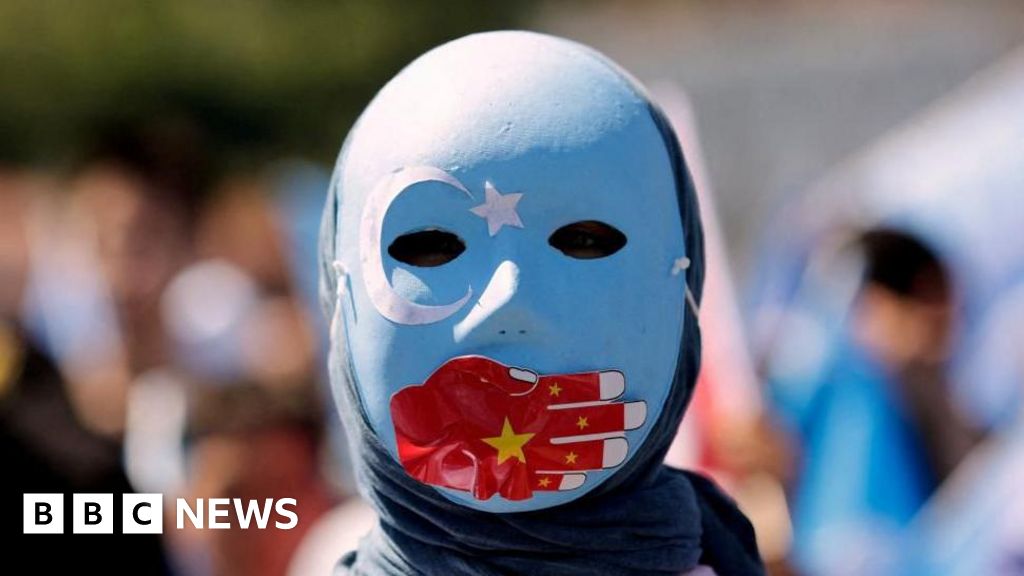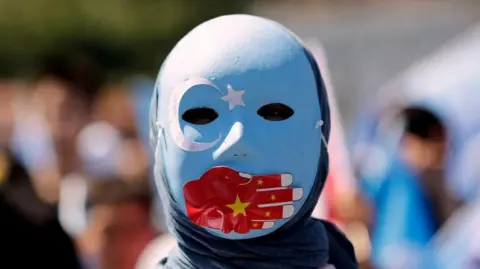
By Anna Lamche, BBC News
 Reuters
ReutersChina has changed the names of hundreds of villages in Xinjiang region in a move aimed at erasing Uyghur Muslim culture, Human Rights Watch (HRW) says.
According to a report by the group, hundreds of villages in Xinjiang with names related to the religion, history or culture of Uyghurs were replaced between 2009 and 2023.
Words such as “sultan” and “shrine” are disappearing from place names – to be replaced with terms such as “harmony” and “happiness”, according to the research, which is based on China’s own published data.
The BBC contacted China’s embassy in London about the allegations.
In recent years, Chinese authorities have been radically overhauling society in Xinjiang in an attempt to assimilate its minority Uyghur population into mainstream Chinese culture.
Researchers from HRW and Norway-based organisation Uyghur Hjelp studied the names of villages in Xinjiang from the website of the National Bureau of Statistics of China over the 14-year period.
They found the names of 3,600 of the 25,000 villages in Xinjiang were changed during this time.
While the majority of these name changes “appear mundane”, HRW said, around one fifth – or 630 changes – remove references to Uyghur religion, culture or history.
Words freighted with meaning for China’s Uyghur population – including Hoja, a title for a Sufi religious teacher, and political or honorific titles such as Sultan and beg – have been replaced with words HRW claims reflect “recent Chinese Communist Party ideology”, including “harmony” and “happiness”.
In one example highlighted by the report, Aq Meschit (“white mosque”) in Akto County, a village in the southwest of Xinjiang, was renamed Unity village in 2018.
A growing body of evidence points to systematic human rights abuses against the country’s Uyghur Muslim population. Beijing denies the accusations.
Most of China’s Uygur Muslims live in the north-west of the country, in areas such as Xinjiang, Qinghai, Gansu and Ningxia.
There are roughly 20 million Muslims in China. While China is officially an atheist country, the authorities say they are tolerant of religious freedom.
However, in recent years observers say they have witnessed a crackdown on organised religion across the country.
According to HRW, while the renaming of villages and towns appears ongoing, most of the place names were changed between 2017 and 2019.
The group claims this coincides with an escalation in hostilities against the Uyghur population in Xinjiang.
China has used the threat of “violent terrorism, radicalisation and separatism” in the past to justify the mass detention of the country’s minority Uyghur population.
Maya Wang, the acting China director at Human Rights Watch, said: “The Chinese authorities have been changing hundreds of village names in Xinjiang from those rich in meaning for Uyghurs to those that reflect government propaganda
“These name changes appear part of Chinese government efforts to erase the cultural and religious expressions of Uyghurs,” she added.
The research follows a report published last year in which HRW accused the Chinese state of closing, destroying and repurposing mosques in an effort to curb the practise of Islam in China.

